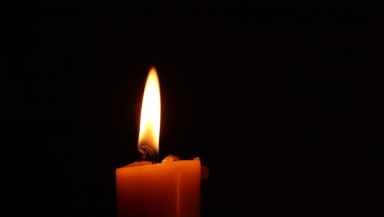
Jewish academic and Hebrew scholar Irene Lancaster reflects on the anniversary of the October 7th terrorist attack on Israel.
We have just finished celebrating Rosh Hashana and start the 10-day period between Jewish New Year and Yom Kippur, the Day of Atonement, when G-d judges us.
Other Jewish festivals take place at full moon and last in Israel for one day only. Rosh Hashana takes place at the darkest period of the month and lasts for two days. It is the time of greatest peril and greatest possibility.
Rosh Hashana is about sacrifice and difficult childbirth. In Genesis, when Sarah learns that Abraham took her son Isaac to be sacrificed, she passes away. She herself gave birth to him in very old age and calls him Isaac - laughter - because the whole notion of giving birth at her age is laughable.
We read about Hannah who is taunted for lack of children but then, in the Book named after him, gives birth to the prophet Samuel who will go on to choose the first monarch in Israel.
But in Jeremiah 31, Rachel will always weep for her children, as she does also today.
Even the blowing of the shofar 100 times during the Rosh Hashana service reminds us of the prophet Deborah in Judges 5, who is called to deal with the Canaanite conqueror, Sisera.
As Jews we are not allowed to triumph over the death of the enemy but are instead encouraged to be grateful to G-d. And in her song of gratitude, Deborah notes that Sisera's mother whimpered over the death of her son and this sound is reflected by the plaintive sound of the shofar at Rosh Hashana.
The sound of the shofar nullifies the cruelty of Sisera and his mother and brings G-d's compassion upon us.
Today we have new Sarahs, Hannahs, Rebeccas and Deborahs among us in Israel. We have women who have contributed to the army and intelligence services in modern Israel, who run battalions and man planes. We have women who devised the pagers and other mechanisms which rid the world of murderous terrorists, just as Deborah conquered Sisera, and we also have record numbers of children born in Israel this year.
After a long gap I visited Israel twice this year. I was struck by the huge cruelty towards Jewish passengers by airport staff in this country, and the feeling of indescribable wellbeing when touching down in war-torn Israel.
In Jerusalem I met the doulas and others who had looked after my daughter displaced from the north because of the war and marvelled at the kindness of strangers in Jerusalem who fed them for three weeks after the birth of my granddaughter.
A Christian friend of many years standing just wrote to me that he will be fasting on October 7 and said that the birth of my granddaughter in Israel gives life and hope in a time of destruction.
This is the message of Rosh Hashana - even at the darkest times when all appears to be night and barren, there is always a glimmer of hope that brings joy to the world.
May we hope that the new year brings much needed good government to the world, that the forces of evil are destroyed and that the sounds of song and laughter continue to be heard on the streets of Jerusalem and throughout the world.













